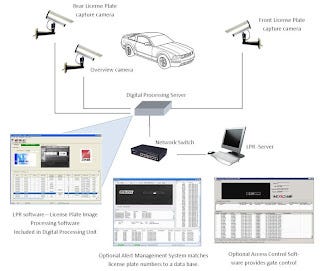License plate readers to spread to nearly every police dept. will Americans have any privacy?

A recent survey (.pdf) by the Police Executive Research Forum(PERF) reveals that license plate readers will soon be a pervasive monitoring technology among law enforcement agencies, according to a blog post from the American Civil Liberties Union. Seventy-one percent of responding agencies already have LPRs and 85 percent plan to acquire or increase their use of LPRs during the next five years.
The benefits of LPR technology are undeniable, says the ACLU, quoting a police officer in the PERF survey who said that when LPRs were used police were able to get over eight times as many checks, more than four times as many hits, and about twice as many arrests and vehicle recoveries as when they were not using the LPR devices. Clearly, the privacy rights group concludes, the technology is here to stay.
"There doesn't seem to be much hope that we could roll back the expansion of the technology itself," wrote Kade Crockford, director of the ACLU of Massachusetts Technology for Liberty Project, in the blog. "But thankfully we can take simple steps to limit the privacy harms."
The PERF survey shows that the ACLU was right to act early.
Writing in “How Are Innovations in Technology Transforming Policing,” a report partially underwritten by a foundation connected to the LPR manufacturer Motorola, PERF’s executive director Chuck Wesler demonstrates that police departments nationwide are eagerly acquiring the tools. Using statistics from a PERF survey distributed to hundreds of police departments in 2011, he writes:
71 percent of responding agencies already have LPRs. But typically, an agency has only a few vehicles equipped with the devices, and they are used for certain limited purposes, such as finding stolen cars or vehicles that have multiple parking violations and can be booted or towed. But our survey found that almost every police agency expects to acquire or increase their use of LPRs in coming years, and that five years from now, on average they expect to have 25 percent of their cars equipped with LPRs.
According to PERF’s survey results, most of the queried agencies without license plate reader systems plan to get them, and those that already use them plan to expand their programs:
A large majority of agencies (85 percent) plan to acquire or increase their use of LPRs during the next five years. On average, responding agencies expect that 25 percent of their vehicles will have LPRs on board in five years.
The price of license plate reader systems is likely to fall precipitously as the technology becomes an increasingly common law enforcement fixture. It’s already fallen substantially over the past few years, after a boom in sales prompted by federal funding for the technologies to state and local police departments nationwide. Whereas years ago the tools cost upwards of $30k per system, some companies are now selling them for as little as $8k a piece.
For privacy advocates, there doesn’t seem to be much hope that we could roll back the expansion of the technology itself. But thankfully we can take simple steps to limit the privacy harms.
The most central functions license plate readers perform don’t require that agencies store captured plate information on everyone for long periods of time, enabling mass, retroactive, warrantless surveillance. In fact, police don’t need to retain any captured plate data at all in order to catch people driving stolen cars or with outstanding warrants.
A police officer from Mesa is quoted in the PERF report describing how successful the technology has been for the agency:
when LPRs were used, police were able to get over eight times as many checks, over four times as many hits, and about twice as many arrests and vehicle recoveries as when they were not using the LPR devices.
Those are pretty impressive stats, and those successes don’t require any data retention whatsoever -- making it clear that police can use the technology to great effect without needlessly violating our privacy.
PERF’s discussion on license plate readers also sheds light on a troubling facet of the post-9/11 federal funding of path-breaking law enforcement tools: policymaking-by-procurement. When local police want to get money from the feds to buy fancy new tools, they should approach the public—the people they protect and serve—before pursuing acquisitions, especially when those tools have implications for privacy. It isn’t appropriate for departments to move forward with such technologies without any public debate. Revealingly, the officer from Mesa quoted above told PERF:
In some communities there is a strong negative public reaction to the use of surveillance technologies. While we were doing [the license plate reader] study in Mesa, there was controversy throughout Arizona over the use of speed enforcement cameras on major roadways. The LPR program didn’t receive that sort of public reaction, probably because it was a much smaller program and not as many people knew about it.
That isn’t right. The police shouldn’t be able to slip things like the introduction of powerful new surveillance technologies under our noses.
http://www.fiercegovernmentit.com/story/license-plate-readers-quietly-become-prevalent-law-enforcement-technology/2013-01-17
http://www.aclu.org/blog/technology-and-liberty/report-85-percent-law-enforcement-agencies-will-have-license-plate
Automated license plate recognition (ALPR) systems: Policy and operational guidance for law enforcement.


